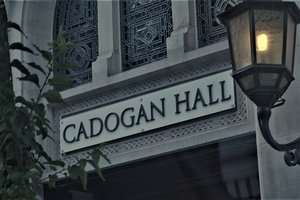Concerto Budapest & András Keller with Angela Hewitt at Cadogan Hall

The Zurich International Orchestra Series at Cadogan Hall has pulled many rabbits out of hats, and this UK debut from Concerto Budapest was quite an ear-opener. Concerto Budapest has been in business since 1907 (as the Hungarian Symphony Orchestra) and significantly refreshed by András Keller (founder of the Quartet that bears his name) who became Chief Conductor in 2007. The combination made a huge impression, mainly based on an infectious enthusiasm that flooded over the footlights, a seize-the-moment impulsiveness present in abundance.
The role of overture was assumed by Bartók’s Concerto for Orchestra, as substantial a presentation of credentials as you could expect from this dream-team band. In a work that starts like Bluebeard’s Castle and ends like The Miraculous Mandarin, Concerto Budapest showed off the calibre of its playing with great flair. The trumpets sliced through the brooding introduction like silver daggers, and, incidentally, reminded how often Britten’s brass-writing sounds like Bartók’s. The bassoons were irresistible in the ‘couples’ movement, followed by the ‘Elegy’, music of the night given ample blackness, depth and drama. The keening strings added extra bite to the Lehár/Shostakovich parody in the ‘Interrupted Intermezzo’, followed by the impetuous momentum of the final movement. The Concerto Budapest sound was cultivated, and any brightness was leavened by the richness of the lower strings, given breadth and ballast by a dynamic viola section.
Following the interval, Mozart’s A-major Piano Concerto (K488/No.23), a notably intimate work, without any trumpet-and-drum swagger, but including eloquent clarinets. With the string sections each reduced by a desk, Keller, who had been on top of all the detail in the Bartók, here was more persuasive than organising, the sort of insider conducting that suits Hewitt’s conversational elegance. In this most operatic of Mozart’s Piano Concertos, the give and take between soloist and ensemble got hallucinatingly close to speech. There was often something subversive in the way Hewitt improved or elaborated on an orchestral comment, along with some sublimely civilised games in play as the players enjoyed brief moments of triumphant ascendancy. Hewitt was remarkably in-tune with the Adagio’s quasi-Blues sadness, showing an emotional depth eventually comforted by the lovely woodwind, and coaxed by discreet expressive looks and nods from the soloist. Her encore was Scarlatti’s ultra-charming Sonata in E, Kk380, the one with the little military fanfares threading through it.
Beethoven’s Fifth Symphony has warhorse status, in that you think you know it so well. Keller and Concerto Budapest addressed this in a gripping performance that made you listen as if for the first time. Even with the exposition repeat, the first movement sounded taut and almost epigrammatic; the Andante con moto had a subtle and relaxed energy; and Keller’s delivery of the Scherzo into the opening blast of the Finale only went to show what a wonderful, revolutionary work this is.
There were two encores, the Finale of Beethoven’s Second Symphony and Brahms’s Hungarian Dance No.5.
via colinscolumn.com
